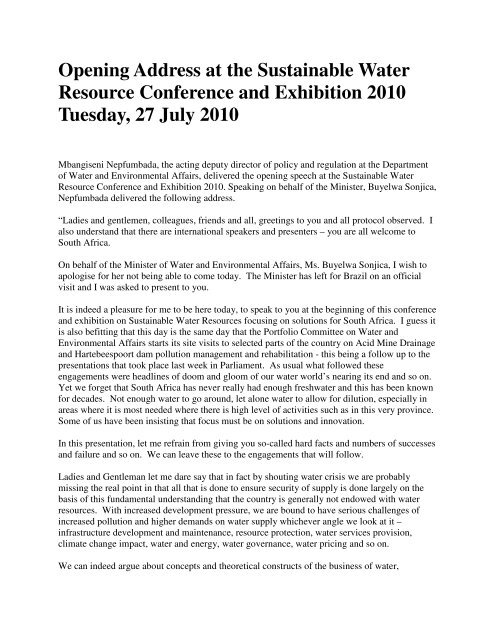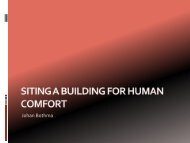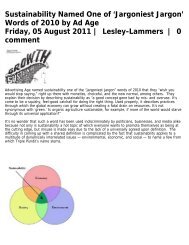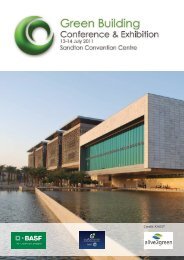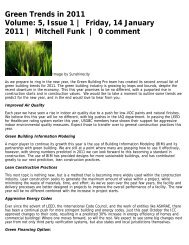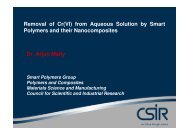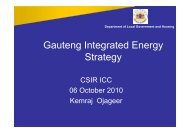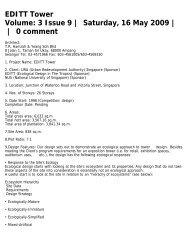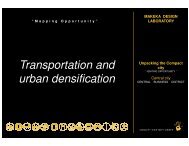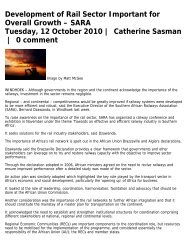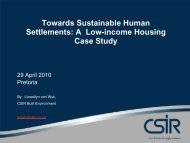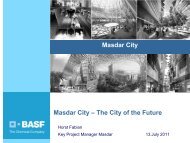Opening_Address_Mbangiseni Nepfumbada, acting ... - Alive2green
Opening_Address_Mbangiseni Nepfumbada, acting ... - Alive2green
Opening_Address_Mbangiseni Nepfumbada, acting ... - Alive2green
Create successful ePaper yourself
Turn your PDF publications into a flip-book with our unique Google optimized e-Paper software.
<strong>Opening</strong> <strong>Address</strong> at the Sustainable Water<br />
Resource Conference and Exhibition 2010<br />
Tuesday, 27 July 2010<br />
<strong>Mbangiseni</strong> <strong>Nepfumbada</strong>, the <strong>acting</strong> deputy director of policy and regulation at the Department<br />
of Water and Environmental Affairs, delivered the opening speech at the Sustainable Water<br />
Resource Conference and Exhibition 2010. Speaking on behalf of the Minister, Buyelwa Sonjica,<br />
<strong>Nepfumbada</strong> delivered the following address.<br />
“Ladies and gentlemen, colleagues, friends and all, greetings to you and all protocol observed. I<br />
also understand that there are international speakers and presenters – you are all welcome to<br />
South Africa.<br />
On behalf of the Minister of Water and Environmental Affairs, Ms. Buyelwa Sonjica, I wish to<br />
apologise for her not being able to come today. The Minister has left for Brazil on an official<br />
visit and I was asked to present to you.<br />
It is indeed a pleasure for me to be here today, to speak to you at the beginning of this conference<br />
and exhibition on Sustainable Water Resources focusing on solutions for South Africa. I guess it<br />
is also befitting that this day is the same day that the Portfolio Committee on Water and<br />
Environmental Affairs starts its site visits to selected parts of the country on Acid Mine Drainage<br />
and Hartebeespoort dam pollution management and rehabilitation - this being a follow up to the<br />
presentations that took place last week in Parliament. As usual what followed these<br />
engagements were headlines of doom and gloom of our water world’s nearing its end and so on.<br />
Yet we forget that South Africa has never really had enough freshwater and this has been known<br />
for decades. Not enough water to go around, let alone water to allow for dilution, especially in<br />
areas where it is most needed where there is high level of activities such as in this very province.<br />
Some of us have been insisting that focus must be on solutions and innovation.<br />
In this presentation, let me refrain from giving you so-called hard facts and numbers of successes<br />
and failure and so on. We can leave these to the engagements that will follow.<br />
Ladies and Gentleman let me dare say that in fact by shouting water crisis we are probably<br />
missing the real point in that all that is done to ensure security of supply is done largely on the<br />
basis of this fundamental understanding that the country is generally not endowed with water<br />
resources. With increased development pressure, we are bound to have serious challenges of<br />
increased pollution and higher demands on water supply whichever angle we look at it –<br />
infrastructure development and maintenance, resource protection, water services provision,<br />
climate change impact, water and energy, water governance, water pricing and so on.<br />
We can indeed argue about concepts and theoretical constructs of the business of water,
however, the bottom line is that we have no choice except judiciously managing the resources<br />
and ensure provision of the services in a manner that improves the lives of our people in a<br />
sustainable manner. The level of awareness of conservation and demand management has to<br />
increase significantly if we are to succeed.<br />
We can also not afford complacency resulting from the fact that those of us who are able to get<br />
together in these very beautiful facilities, drinking bottled water and enjoying the networking<br />
atmosphere, form a small part of our society. A great number of our people remain with limited<br />
access to water and other basic necessities. The link of water to all aspects of our lives need not<br />
be overemphasised.<br />
I recall in these very same facilities when a few years ago, the Department lead a process of<br />
stakeholder engagement on Water Allocation Reform (WAR). In this meeting I recall the<br />
exchanges we had with community representatives and was interested to see that by and large<br />
our people are well aware of water issues and that we should involve them in many ways. In<br />
hindsight, we probably could have done more since then. Our debates and discussions should<br />
also reflect on these very critical aspects of our societal needs that include bringing into the<br />
sector those that have previously been marginalised and ensuring that the tools that were created<br />
to achieve these goals are put into effect. I strongly believe it is not just a matter of policy and<br />
legislation but can also be seen as simply good economics or economic sense. Water, however<br />
limited, can be a catalyst for social and economic development. It is a key connector to<br />
livelihoods and development.<br />
As many of you will be aware, the Department is stepping up the regulatory regime and<br />
focussing on programmes that are aimed at improving the quality and availability of water for<br />
various needs. The blue drop, the green drop and monitoring and enforcement initiatives are all<br />
part of this process.<br />
We have heard in the past that our water policy and legislation ranks among the best in the<br />
world. However, implementation of these policies has been a serious challenge. It is through<br />
engagements like this conference that will take us far. There is a clear need for us as a country,<br />
including the international community, business sector and all to work in partnerships to ensure<br />
that we succeed in implementation. While at it, I recall a colleague once saying something to the<br />
effect that “restating the problem several times may remind you of the problem but it will not<br />
bring you any closer to the solution”.<br />
Indeed in preparing for this presentation, I took notice of the thematic areas covered by the<br />
presentations from infrastructure, water efficiency, climate change, water-business relationship,<br />
water treatment issues and so on. These are very critical issues to be dealt with at this level. I<br />
must confess though that for me personally, it is somewhat daunting to talk to you who very<br />
often qualify to be captains of the industry so-to-speak. However, I find solace in the fact that I<br />
have been privileged to have not only been part of the water policy development and saw the<br />
first edition of the National Water Resources Strategy (NWRS) in 2004, but currently involved<br />
with the review of the strategy. As stated in your publication material,“Technology,<br />
management, infrastructure development, planning, partnerships, governance, education,<br />
engineering and publicity are all required for a comprehensive Sustainable Water Resource plan<br />
that involves government, business and consumers.
The current review of the National Water Resources Strategy draws significantly from the<br />
engagements the Department has had as part of Water for Growth and Development process with<br />
sub-strategies covering aspects of desalination, the so-called water mix, national groundwater<br />
strategy, information and technology innovation, and so on. I’m sure this conference will go a<br />
long way to inform the Department in its effort to review the strategy and charting our water<br />
future. The list of invitees is cross-cutting from national to local government level and water<br />
industry from suppliers, users, practitioners and researchers. This bodes well in that it indeed<br />
represents a significant part of the sector.<br />
This presentation would not be complete if I do not specifically speak to the issue of education<br />
and capacity building in the sector. I have taken note of the fact that one of the targeted<br />
participants in this conference is Tertiary Institutions Stakeholders. As someone who has taught<br />
at college and university in my past life, and having worked in the scientific services<br />
environment, I can perhaps speak on this with some level of authority and better understanding<br />
of the situation.<br />
For us to tackle the future challenges in the water sector we need to ensure that capacity is built<br />
in various fronts. Some of you may be aware that a few years ago, the Department had to<br />
establish a learning academy to develop capacity – the reality is that like many sectors, all the<br />
different thematic areas that are covered in this conference for instance require a strong cadre of<br />
new and young leaders to take us beyond where we may be today. We need to actively ensure<br />
that the critical mass is deliberately and consciously increased as the complexity of the<br />
environment we are dealing with increase all the time. This we must do as a matter of course.<br />
The significance of this, especially to supply skills to local government cannot be<br />
overemphasised. The fact that we are stepping up implementation means that we have to<br />
increase the critical mass across all skills levels and requirements. As you may be aware many<br />
studies have shown this very critical gap which we must urgently address.<br />
Let me conclude with what I think the Minister would wish – that your deliberations be another<br />
milestone, a key contribution to building solutions and support decision making in these very<br />
important aspects of our development as a country and continent. We cannot afford to flounder.<br />
I wish you all the success in your deliberations during these two days and look forward to the<br />
outcome of the conference. I can assure you that the Department will be following the results<br />
very closely.<br />
I thank you.”<br />
<strong>Nepfumbada</strong> was followed by Canadian speaker Don Degen presented a talk on practical steps<br />
towards water sustainability. The Sustainable Water Resource Conference and Exhibition 2010<br />
brought together together leading thinkers, academics, researchers and industry practitioners and<br />
businesses to contribute the most comprehensive, practical and innovative ideas, system designs<br />
and proposed interventions and policies on water in South Africa.


